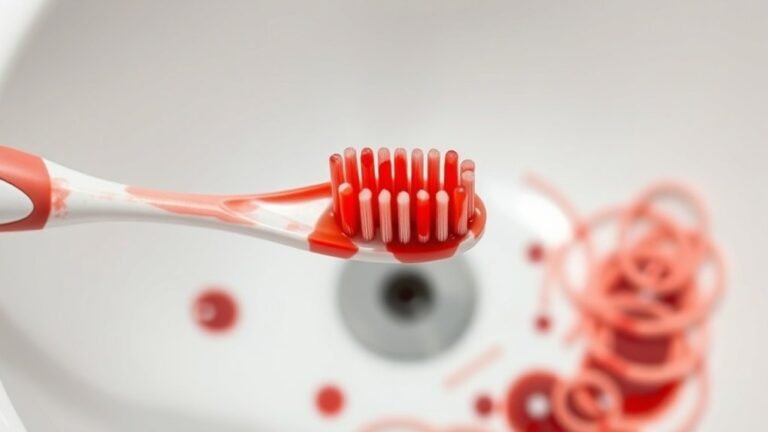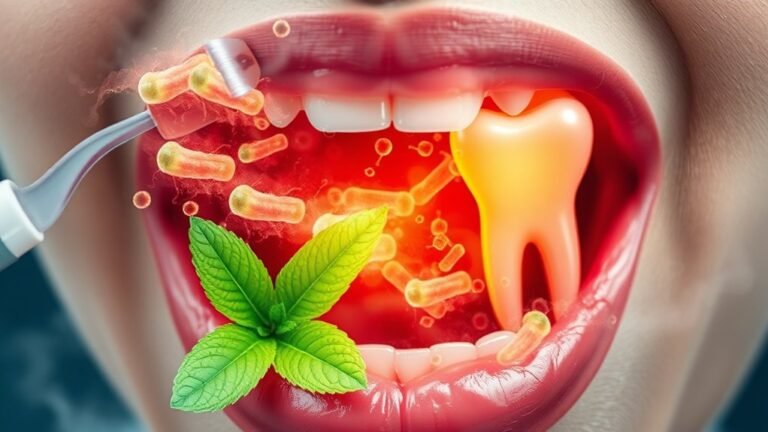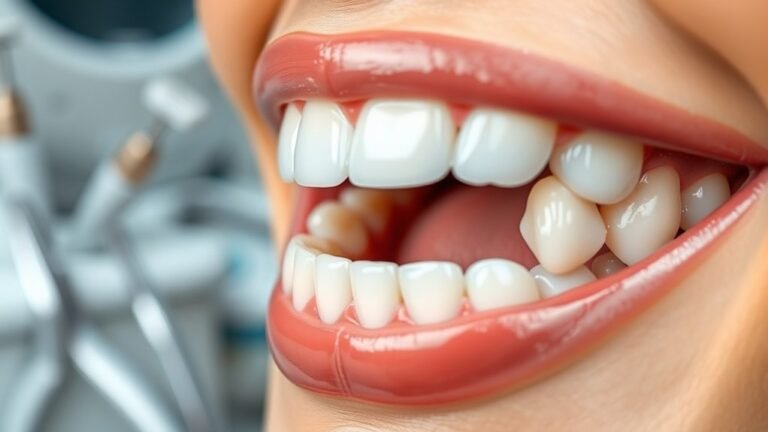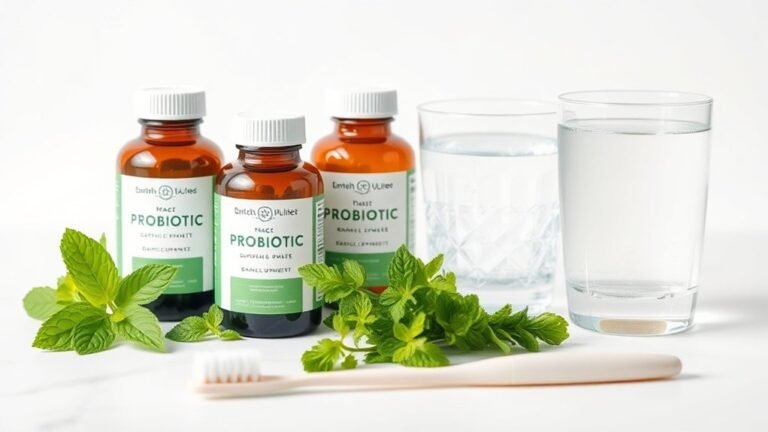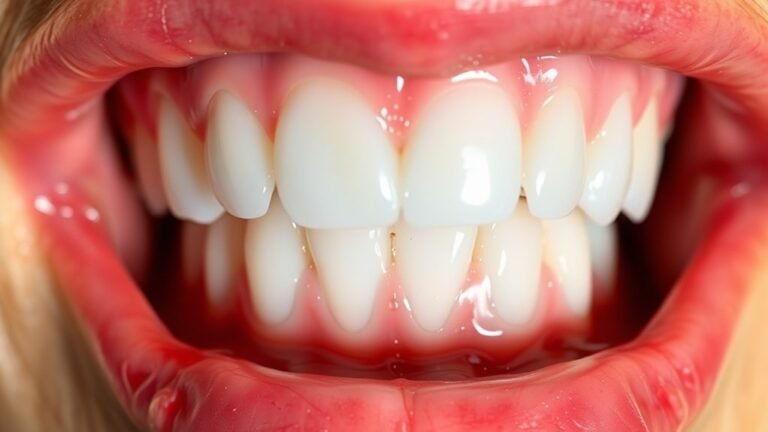What Foods Support a Balanced Oral Microbiome to Prevent Chronic Dental Problems
To support a balanced oral microbiome and prevent chronic dental problems, focus on probiotic-rich foods like yogurt and kefir, which help inhibit harmful bacteria. Incorporate prebiotic foods such as fibrous fruits and vegetables that nourish beneficial bacteria. Crunchy options like apples and carrots act as natural cleaners, while dairy products provide essential calcium. Ultimately, limit sugar intake to maintain a healthy oral pH. Exploring these dietary choices can enhance your oral health even further.
Key Takeaways
- Probiotic-rich foods like yogurt and kefir help maintain healthy oral flora and inhibit harmful bacteria, reducing dental issues.
- Prebiotic foods such as bananas and onions stimulate beneficial bacteria growth, promoting a balanced oral microbiome.
- Crunchy fruits and vegetables, like apples and carrots, naturally clean teeth and stimulate saliva production, aiding in plaque control.
- Calcium-rich foods strengthen enamel and contribute to overall oral health, preventing chronic dental problems.
- Limiting sugary snacks and beverages reduces harmful bacteria growth, promoting a healthier oral environment.
The Importance of a Balanced Oral Microbiome
A balanced oral microbiome is essential for maintaining overall health and preventing various dental issues. When your oral microbiome is in harmony, it supports ideal oral health by regulating harmful bacteria that can lead to cavities and gum disease. This balance also plays a vital role in oral immunity, as beneficial microbes can enhance your body’s defense against infections. An imbalance, however, may result in dysbiosis, increasing the risk of inflammatory conditions and impacting systemic health. By fostering a diverse and balanced oral microbiome, you not only protect your teeth and gums but also contribute to your overall well-being. Prioritizing oral health through lifestyle choices can greatly enhance your oral immunity and promote long-term dental health.
Probiotic-Rich Foods for Oral Health
Incorporating probiotic-rich foods into your diet can greatly enhance your oral health by promoting a balanced microbiome. Probiotics, found in foods like yogurt, kefir, and fermented vegetables, help support healthy oral flora, which is essential for preventing dental issues. These beneficial bacteria can inhibit the growth of harmful microbes, reducing the risk of cavities and gum disease. Additionally, some probiotic-rich foods possess antibacterial properties, further protecting your oral health. For instance, certain strains of Lactobacillus can combat harmful bacteria in the mouth. By regularly consuming these foods, you can create an environment in your mouth that favors beneficial bacteria, ultimately leading to improved oral hygiene and a lower likelihood of chronic dental problems.
Prebiotic Foods That Nourish Beneficial Bacteria
Prebiotics play a vital role in supporting beneficial bacteria in your oral microbiome. By incorporating top prebiotic foods into your diet, you can enhance not only your overall health but also your oral health. Understanding how these foods nourish your microbiome is essential for maintaining a balanced environment in your mouth.
Importance of Prebiotics
Nourishing beneficial bacteria in your oral microbiome is essential for maintaining overall health, and prebiotic foods play an important role in this process. Prebiotics are non-digestible dietary fibers that stimulate the growth of beneficial gut microbiota. By including these foods in your diet, you can enhance your oral health and support a balanced microbiome.
Here are some key benefits of prebiotics:
- Promote beneficial bacteria: They help beneficial bacteria thrive, improving your oral and gut health.
- Enhance nutrient absorption: Prebiotics aid in the absorption of essential nutrients, contributing to overall wellness.
- Support immune function: A balanced microbiome boosts your immune system, helping prevent chronic dental problems.
Incorporating prebiotic-rich foods guarantees your oral microbiome stays healthy and resilient.
Top Prebiotic Foods
To support the growth of beneficial bacteria in your oral microbiome, choosing the right foods is key. Incorporating prebiotic foods into your diet enhances dental hygiene by promoting the balance of bacteria that combat inflammation. Here are some top prebiotic foods to contemplate:
| Food | Prebiotic Type | Benefits |
|---|---|---|
| Garlic | Fructooligosaccharides | Reduces inflammation |
| Onions | Inulin | Supports beneficial bacteria |
| Bananas | Resistant starch | Aids digestion |
| Asparagus | Inulin | Enhances gut health |
| Chicory root | Inulin | Improves nutrient absorption |
How Prebiotics Benefit Oral Health
While many people focus on brushing and flossing for ideal oral hygiene, the role of prebiotic foods in supporting oral health is often overlooked. Prebiotics nourish beneficial bacteria in your mouth, helping to balance the oral microbiome and potentially reducing the risk of oral infections. Incorporating these foods into your diet can also provide essential antioxidants, promoting overall gum health.
Consider adding these prebiotic-rich foods to your meals:
- Garlic
- Onions
- Bananas
These foods not only support beneficial bacteria but also enhance your immune response, which can further protect against harmful pathogens. By prioritizing prebiotics, you’re taking a significant step toward maintaining a healthier mouth and preventing chronic dental issues.
Crunchy Fruits and Vegetables for Natural Cleaning
A variety of crunchy fruits and vegetables can greatly contribute to maintaining a balanced oral microbiome. Foods like apples, carrots, and celery act as natural toothbrushes, helping to scrub away dental plaque as you chew. This mechanical action not only removes food particles but also stimulates saliva production. Saliva is essential for neutralizing acids and washing away harmful bacteria, promoting a healthier mouth environment. Additionally, the fiber in these crunchy snacks encourages beneficial bacteria to thrive while inhibiting the growth of pathogens. Incorporating more crunchy fruits and vegetables into your diet can enhance your oral hygiene routine, providing a delicious way to support your dental health and overall well-being. So, munch away for a brighter, healthier smile!
Dairy Products and Their Role in Oral Microbiology
Dairy products play an essential role in maintaining your oral health through their calcium content, which strengthens teeth and bones. Additionally, many dairy products contain probiotics that can enhance your oral microbiome by promoting beneficial bacteria. Understanding these benefits can help you make informed dietary choices for better oral hygiene.
Calcium and Oral Health
Calcium plays an essential role in maintaining oral health, particularly through its presence in dairy products. Adequate calcium intake is critical for cavity prevention and enamel protection, which are important for a healthy mouth. Incorporating dairy into your diet can have several benefits:
- Strengthens enamel: Calcium helps remineralize enamel, making it more resistant to decay.
- Promotes saliva production: Dairy products stimulate saliva, which neutralizes acids and supports a balanced oral microbiome.
- Supports bone health: Healthy jawbone structure is essential for holding teeth in place, preventing tooth loss.
Probiotics in Dairy Products
When you consume probiotics found in dairy products, you’re not just enjoying a tasty treat; you’re actively promoting a healthier oral microbiome. Probiotics in dairy, like yogurt and kefir, contribute beneficial bacteria that can enhance the gut-oral axis, the connection between your gut health and oral health. These probiotics help in managing bacterial biofilm formation on your teeth and gums, potentially reducing harmful bacteria associated with dental issues. Research shows that incorporating these probiotics can lead to a more balanced oral environment, decreasing the risk of cavities and gum disease. By including dairy products rich in probiotics in your diet, you’re taking a proactive step toward maintaining ideal oral health and overall wellness.
The Impact of Sugar on Oral Bacteria
While it may be tempting to indulge in sugary treats, the impact of sugar on oral bacteria can seriously undermine your dental health. Excessive sugar consumption alters your oral pH, creating an environment where harmful bacteria thrive. This can lead to plaque buildup and increase the risk of cavities and gum disease. To maintain ideal oral health, consider these strategies:
Excessive sugar consumption can harm your dental health by promoting harmful bacteria and increasing the risk of cavities and gum disease.
- Limit sugary snacks and drinks.
- Opt for natural sweeteners like honey or stevia.
- Incorporate foods that enhance plaque control, such as crunchy fruits and vegetables.
Hydration and Its Effect on Oral Health
Staying well-hydrated plays an essential role in maintaining ideal oral health, as it helps to wash away food particles and bacteria that can contribute to dental issues. Proper hydration supports saliva production, which is critical for neutralizing acids and preventing tooth decay. Nutrition and hydration go hand in hand; when you drink plenty of water, you’re not only aiding your oral microbiome but also enhancing your overall nutritional status. Insufficient hydration can lead to dry mouth, increasing the risk of chronic dental problems such as cavities and gum disease. By prioritizing hydration, you can effectively contribute to a balanced oral microbiome and protect your dental health in the long run. So, keep that water bottle handy!
Frequently Asked Questions
Can Oral Microbiome Imbalances Lead to Systemic Health Issues?
Yes, oral microbiome imbalances can lead to systemic health issues. They’re linked to conditions like heart disease and diabetes. Maintaining a healthy oral microbiome is essential for your overall health and well-being.
How Often Should I Consume Probiotic Foods for Best Results?
For best benefits, you should savor probiotic foods daily. Consistent consumption fosters favorable flora, supporting your overall health. Incorporating yogurt, kefir, or fermented vegetables enhances your well-being while balancing beneficial bacteria in your body.
Are There Specific Foods to Avoid for Optimal Oral Health?
You should avoid sugary snacks, acidic beverages, and processed foods. These items can disrupt your oral microbiome, leading to increased plaque, decay, and gum disease. Focus on whole foods to maintain ideal oral health.
What Role Does Stress Play in Oral Microbiome Health?
Stress acts like a storm, disrupting your oral microbiome’s balance. It can lead to inflammation and increased harmful bacteria, negatively impacting your dental health. Managing stress through mindfulness can help maintain a healthier oral environment.
Can Oral Hygiene Practices Affect the Oral Microbiome Balance?
Yes, your oral hygiene practices greatly affect your oral microbiome balance. Regular brushing, flossing, and using antibacterial mouthwash can help maintain a healthy microbiome, reducing harmful bacteria and promoting beneficial microbial communities for better oral health.
Conclusion
Incorporating foods that support a balanced oral microbiome can be a game-changer for your dental health. Imagine banishing cavities and gum disease as if you had a magical shield! Probiotic-rich yogurts, crunchy veggies, and hydrating fruits can create an army of beneficial bacteria, while sugary treats act like villains lurking in the shadows. By choosing the right foods, you’re not just nourishing your mouth; you’re releasing a fortress of oral health that stands the test of time.

